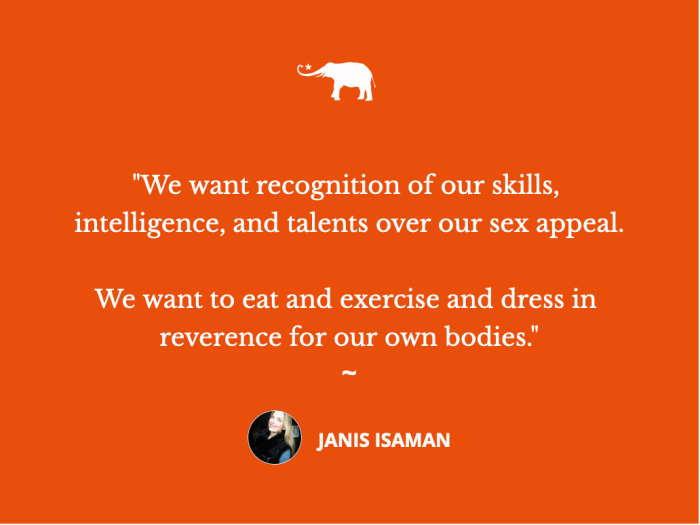With the heat of the July sun radiating onto my right arm, I rode my yellow BMX bike northbound on the black asphalt shoulder of the highway.
My 10-year-old body was steaming hot from the pumping of my legs. The reflection of heat from the road, George Michael, and the 80s Juno-106-generated synth blared in my ear:
“Every man’s got his patience
And here’s where mine ends
I want your sex“
Nobody around for miles, I started into endless wheat fields and miles of yellow lines of the highway, stopping only to unclip the Walkman from my pants when the song ended, rewind, and press play again.
“What’s your definition of dirty baby
What do you consider pornography”
I rewound until the edge of the cassette reel marked the beginning and end of the 4:56 minute mark.
“C-c-c-c-come on”
I had no idea that cassette would synthesize my adult life.
The female role is typically one of provision—a tool for someone else’s visual and sexual pleasure. It’s seen as nearly an obligation: if we are given breasts and hips, it’s deemed that we must endow the world with visuals of them. We are coached and coerced to endlessly titillate men.
We manicure and landscape every inch so we are hairless, wrinkle-less, ageless, and attractive. We are to don clothing and garments that scintillatingly highlight our figures.
No matter how much we provide, we are met with endless demands for more. “Can you send me a full-body shot?” is a dating essential; without it, we will literally be deleted by a potential suitor.
We are met with a nearly endless onslaught of hypersexualized and nearly pornographic verbal replies from men. I once had a man lick my ear in a nightclub and ask me, “Do you like sex?”
The justification for this is the oft-repeated cultural cry that “men are visual” and therefore need this stimulation. (Never mind that it’s entirely a construct of our culture.)
MRI brain scan data shows that:
“…Men and women don’t differ much at all in the brain pathways that respond to sexually arousing visual stimuli…being male or female contributes very little to which neural networks fire up…”
Yet we prefer to accept mythology over science and continue to be believers:
“Every man’s got his patience.
I want your sex”
I remember the first time I discovered that the main cultural function of my body was to be a tool of pleasure for men. Now miles from the wheat fields of my youth, yet attired in nothing more sensual than jeans and a flannel shirt, I felt a strange man’s hands on my body.
I wanted his hands off me and for him to leave me alone. I heard sexuality dripping from his voice, and it scared me.
I didn’t want to say yes. And I didn’t know how to say no.
I could feel the scratching of frustration in my chest—burning from the innards of my heart. The irritation ignited a heat with remnants from my chest to my throat. The effect was like sitting by a campfire and inhaling hot smoke.
His lust, to me, was violating. I felt confused, angry, and hollow.
His lust, to him, may have felt like a reunion with his authenticity, a recovering of his wholeness and a path to nurturing. A byproduct of men’s forcibly repressed emotions, lust is one of the few outlets men are culturally given to feel alive and emotionally connected.
His drive for connection was my drive for disconnection.
I wanted out of my body, and I found an escape by ingesting enough drinks to float away. I realized that this was the only chance I had to feel the freedom and carefree agency over my body that I once enjoyed in childhood.
This scene was to repeat itself thousands of times.
Women are oft faced with a choice: honour the authenticity of their own desires or perform the cultural duty of pleasing the eyeballs, brains, and appendages of men. If our authentic desire is to say no, we may face retribution. And in that, “choice” is often not a choice.
I tried to conform, adopting fitness as part of my essential daily lifestyle in order to appear thin but toned. I painted my nails and bought skintight jeans. I sent selfies and sexts that made me uncomfortable.
I also tried to say no and was called a “b*tch,” and told I was “frigid’ and a “prude.” I’m sure some women have even had men threaten to throw them down multiple flights of stairs or laid hands and mouths upon them after they’ve told them not to.
Men are blowing their lust through women’s bodies as a tool to compensate for being culturally emotionally incapacitated.
And women are performing in a pageant to compensate for having our bodies taken from us.
“What’s your definition of dirty baby
What do you consider pornography”
As I cycled through the choices, none better than the rest, the answer became simple: anything I didn’t want.
In the days of my BMX bike, my body was for exercise, for fun, and for experiencing life through the lens of my senses. I could enjoy the heat on my skin interrupted only by the wind.
I had agency—but I didn’t even appreciate it.
I want it back.
Men get to keep and retain their bodies as their own without constantly monitoring their wrinkles, waist size, or hair. We don’t consider the primary function and purpose of a man to be decorative or a sexual object. Women need to demand the same.
Women’s bodies are not a tool for exciting men. We need to reclaim our bodies as our own.
Women’s bodies are not tools for decorating the world. We are the ones who get to decide what to do with them—when and how.
Our bodies do not belong to the eyes and hands of every man we encounter, ready for evaluation, criticism, contempt, praise, adoration, lust. Our bodies are the protective covering of our soul and our most precious belonging, and we need to demand they be treated accordingly.
We long to return to the days of our youth when the sun on our skin was a pleasure we could enjoy without having to worry about our outfit or the last time we coloured our hair or if our nail polish was chipped. We long to lack concern for our weight or whether our facial features please a man, particularly ones we don’t know.
We want recognition of our skills, intelligence, and talents over our sex appeal.
We want to eat and exercise and dress in reverence for our own bodies.
We want the emotions and sensations in our bodies honored when we raise our voice and decide when to say yes and when to say no.
It’s a work in progress.
The last time a man asked me for a full-body shot, and I smirked, said no, and thought to myself:
“C-c-c-c-come on.”


 Share on bsky
Share on bsky





Read 66 comments and reply